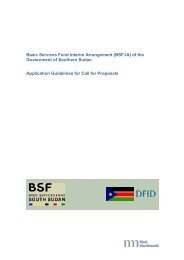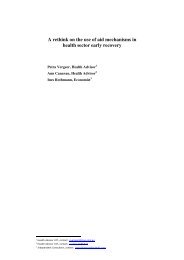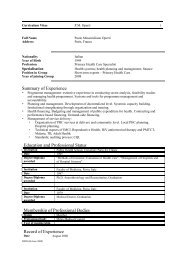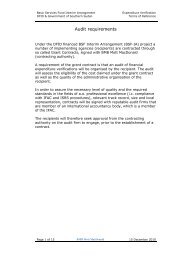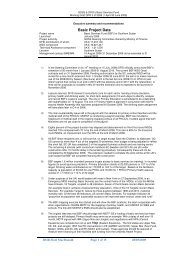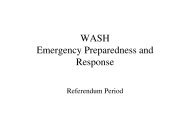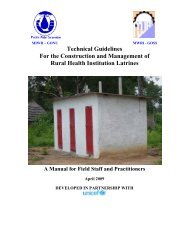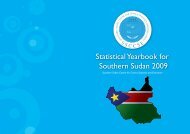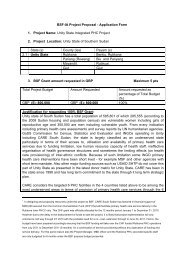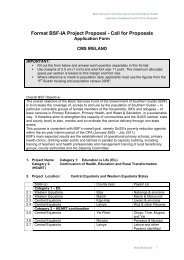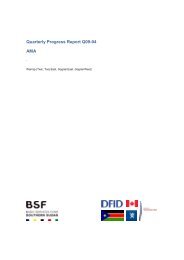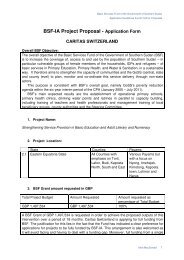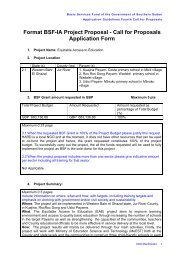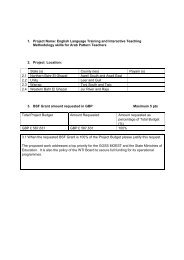INTERSOS BSF-IA Proposal - Basic Services Fund SOUTH SUDAN
INTERSOS BSF-IA Proposal - Basic Services Fund SOUTH SUDAN
INTERSOS BSF-IA Proposal - Basic Services Fund SOUTH SUDAN
You also want an ePaper? Increase the reach of your titles
YUMPU automatically turns print PDFs into web optimized ePapers that Google loves.
<strong>INTERSOS</strong><strong>Basic</strong> <strong>Services</strong> <strong>Fund</strong> of the Government of Southern SudanApplication Guidelines Fourth Call for <strong>Proposal</strong>s3. <strong>BSF</strong> Grant amount requested in GBP Maximum 5ptsTotal Project Budget Amount Requested Amount requested aspercentage of Total Budget(%)GBP 886,565.78 GBP 886,565.78 100 %3.1 When the requested <strong>BSF</strong> Grant is 100% of the Project Budget please justify this request.Maximum 0.25 pageAll direct costs represent the 100% of total budget. This is necessary in order to supply theservices, material, works and trainings foreseen by this proposal.The water and sanitation expert international will be charge only for 13 months during thecore of the project implementation following the technical component.The indirect costs are in share with the overall structure costs of Intersos – Mission inSouthern Sudan. As explained below (efficiency), the structure in Juba is charged 33% on theproject, while structure in Yambio and Ezo is charged 50%.4. Project Summary:Maximum 0.5 pages.Include information on where, what and how, with targets, including training targets and emphasis on working with governmentand/or civil society and sustainability.This project aims to supply the populations in Yambio, Nzara and Ezo Counties with improvedaccess to water, sanitation and hygiene. Locations have been identified in close collaborationwith the Directorate of Rural Water Supply and Sanitation (DRWSS) at state level in WesternEquatoria. The locations are spread among Yambio Town, Nzara Centre, Bangasu and EzoCentral Payams, with a focus on areas with high concentration of IDPs and previouslyunderserved areas. The activities include rehabilitation of 5 boreholes, drilling of 15boreholes, installation of 10 institutional rainwater harvesting systems, construction of 50 pilothousehold rainwater harvesting systems, construction of 50 household latrines for IDPs andtraining of 20 Water Point Committees. The Water Point Committees will be trained on pumpmaintenance and provided with tools to undertake routine maintenance of hand pumps. Formore complex repair the DRWSS will be consulted and actively involved. Hygiene promotionin all targeted areas will be carried out in collaboration with the partner organisation YoungWomen Christian Association (YWCA) who will be responsible for conducting hygienepromotion in each targeted location. Refresh training will be provided to YWCA in hygienepromotion, WASH and reporting/monitoring. The DRWSS will be involved in all stages of theproject, in particular in selection of sites for boreholes and rainwater harvesting systems andin monitoring of activities. Capacity building of the DRWSS will be undertaken throughfacilitating trainings in water quality analysis and WASH. To help ensure the sustainability ofhand pumps a revolving spare parts supply chain system will be established in closecollaboration with DRWSS and UNICEF, with the aim of making spare parts available atPayam level. If successful, the revolving spare parts supply chain system can beimplemented in all Payams in Western Equatoria, increasing the likelihood of functionalboreholes in the future and strengthening the role of DRWSS. With a strong focus on capacitybuilding of the DRWSS, addressing the issue of hand pump maintenance and introducingrainwater harvesting in rural areas, the project has a strong focus on sustainability.Mott MacDonald 3
<strong>INTERSOS</strong><strong>Basic</strong> <strong>Services</strong> <strong>Fund</strong> of the Government of Southern SudanApplication Guidelines Fourth Call for <strong>Proposal</strong>s5. Project Objective:Maximum 0.25 pages.Objective must be Specific, Measurable, Attainable, Realistic and Time-bound (SMART)Increase safe drinking water supply in a sustainable manner for at least 70% of people intargeted bomas in Yambio, Nzara and Ezo Counties within the 18 months of implementation.Contribute towards the Government of South Sudan’s goal to ensure increased access tosanitation and hygiene in the targeted areas and build capacity of local communities and stateauthorities in the area of water, sanitation and hygiene.6. Justification: Maximum40 ptsMaximum 2 pages6.1 Relevance of the project to <strong>BSF</strong>’s overall objectives.The project aims to assist in meeting the overall objective of <strong>BSF</strong> through providing water,sanitation and hygiene in a sustainable manner. This will be accomplished through drillingand rehabilitation of boreholes and through introducing environmentally sustainable rainwaterharvesting; contributing to tackling the issue of lack of spare parts for hand pumps at Statelevel; engaging in latrine construction focusing on IDP households and organising hygienepromotion at village level, highlighting key hygiene messages and the importance ofsanitation. Capacity building is at the core of the project, with trainings to be held forcommunities, partner organization and DRWSS. DRWSS has been closely involved in theplanning of the project and will continue to be involved in all stages of the project, mainly inmonitoring activities and in providing advice on specific locations to target.6.2 What GoSS sector priorities as described in the application guidelines will the projectaddress?The project will above all address the need for increasing access to water in selected countiesin Western Equatoria, with a focus on IDP population and underserved areas. This will beaccomplished through rehabilitation and drilling of boreholes, developing alternative waterschemes (rainwater harvesting) and spreading knowledge on the technology. The project willcontribute to increased access to latrines through construction of household latrines andinstitutional latrines for schools. A strong focus will be made on increasing the awareness onthe importance of hygiene and sanitation in rural areas.6.3 What underserved / priority counties as identified by GoSS and described in theapplication guidelines are targeted?The Ministry of Water Resources and Irrigation welcomes water and sanitation initiatives in allcounties, due to the low levels of access to basic water supply and sanitation in South Sudan.According to figures from GoSS Statistical Yearbook 2009, 35 % of the population in WesternEquatoria has access to improved water sources and 11.2 % are using sanitary means ofexcreta disposal. The mean time to source of drinking water is 30 minutes for WesternEquatoria, the second highest figure in South Sudan. For this project the targeted Counties(Yambio, Nzara and Ezo) and Payams (Yambio Town, Li Rangu, Bangasu, Nzara Centre,Andari, Naandi and Ezo Centre) have been identified in close collaboration with the DRWSSon state level in Yambio, Western Equatoria, and with the State Supervisor from Ministry orWater Resources and Irrigation, in Juba. Locations included areas with IDP concentration,underserved areas and areas where previous water projects have failed.Mott MacDonald 4
<strong>INTERSOS</strong><strong>Basic</strong> <strong>Services</strong> <strong>Fund</strong> of the Government of Southern SudanApplication Guidelines Fourth Call for <strong>Proposal</strong>s6.4 The different target groups and beneficiaries of the project and the specific needs andconstraints of these groups.There is no available data for Western Equatoria at Payam or Boma level concerning thewater and sanitation sector, such as data on persons per borehole, distance to water points,water availability per person, latrine use and hygiene practices. A baseline assessment toidentify the present situation for water and sanitation is therefore needed at the beginning ofthe intervention, while capacity building for the DRWSS will ensure the collection of furtherfigures.The IDP locations this project will target are Kasia in Bangasu Payam and Vitisi, Nakiri andMokongo in Yambio Town Payam. In Kasia (Bangasu Payam) there is one boreholefunctioning and one in need of rehabilitation. People from a 3 km radius fetch water from thishand pump, and the population has increased in the last month due to 250 IDPs moving toKasia from Nyaka as a result of LRA attacks. Vitisi and Mokongo are located within YambioTown, and Nakiri 5 km outside. There are high concentrations of IDPs in these location andinsufficient boreholes or safe water sources, forcing many households to fetch water fromunprotected streams, or to walk up to 2 km to the nearest hand pump. The IDPs have hardlyany access to sanitation, or in some cases only to poorly constructed latrines. Constraints formany of the IDPs include lack of resources and broken support systems which previouslywere in place in their village of origin. The IDPs are adding strain on already scarce waterresources. In areas where the IDPs have fled to the water supply needs to be strengthened toprovide sufficient quantities for both IDP and local populations, to provide water and sanitationservices according to international standards and to avoid creating tensions.Further target groups consist of underserved communities with nearly any access to waterservices and sanitation. They are located far from main towns and some away from the mainroads. The communities targeted in this project are: Donna and Ndvuru (in Li Rangu Payam),where there is a broken down hand pump in Donna (by a school) and a need for an additionalhand pump in Ndvuru centre, which has a high concentration of people. Further underassisted areas are Saura and Hai Matara between Yambio and Nzara. There are 2 boreholesin these two areas and most households walk long distances to fetch just one jerry can ofwater per day, relying on seasonal streams of poor water quality for other uses.In Namaiku (Nzara Centre Payam) several NGOs have tried to drill for water, withoutsuccess. There is one low yielding borehole in this boma, which is not supplying enough forthe population. This project will construct rainwater harvesting systems at the schools inNamaiku, aiming at increasing access to water. Another under assisted area targeted isYabongo in the outskirts of Yambio Town. Yabongo is densely populated and depending on astream, with no access to safe drinking water. A further target targeted area is Ezo County,which has a high IDP population. Due to election insecurity this area could not be assessedand locations for interventions will be selected from a baseline assessment at the beginningof the project.The rural communities have poor hygiene and sanitation knowledge and are in particularneed of hygiene promotion in combination with improved access to safe water supply, toencourage changes in behaviour and increase the use of safe water sources as opposed to,in some instances, more easily accessible unsafe water sources.Area Name Total Population Male FemaleNzara 65,712 34,381 31,331Nzara Centre 30,754 15,810 14,944Mott MacDonald 5
<strong>INTERSOS</strong><strong>Basic</strong> <strong>Services</strong> <strong>Fund</strong> of the Government of Southern SudanApplication Guidelines Fourth Call for <strong>Proposal</strong>sEzo 80,861 41,560 39,301Andari 11,472 5,854 5,618Naandi 10,096 5,077 5,019Ezo Centre 31,644 16,206 15,438Yambio 152,257 78,331 73,926Bangasu 14,646 7,387 7,259Yambio Town 105,881 54,777 51,104Li Rangu 11,068 5,692 5,376County and Payam populations (from Southern Sudan’sFifth population and housing Census, June 2008)6.5 The extent to which women and girls are specifically targeted.As for all interventions of Intersos, and according to its mandate, women and girls will beprioritised in all activities conducted, such as for hygiene awareness and training on handpumps maintenance and repair for the Water Point Committees. A gender-based balance inthe composition of the Water Committee will be assured. Moreover, being the YWCA partnerin the consortium, women will be prioritized during the whole project implementation. Womenof the targeted project areas will be consulted together with the DRWSS concerning locationof new boreholes and water sources, since women possess the best knowledge of watersources and suitable locations due to their daily water fetching chores.7. Description of activities per result and sector: Maximum 5 ptsThis must match the logical frameworkMaximum 3 pages7.1 Include detailed description of each project output and the corresponding activitiesIn the first month of implementation of the project a comprehensive baseline assessment willbe conducted. A format developed by UNICEF and WHO (Core Questions on Drinking-Waterand Sanitation for Household Surveys) will be used to gather information about water andsanitation, and questions concerning hygiene behaviours will be incorporated in this format.The purpose of the assessment is to establish baseline data for water supply, sanitation andhygiene behaviours in all targeted areas. The information collected will provide a betterunderstanding of the needs of the population, including information about their previousknowledge, practises in place and attitudes. Based on the findings of the baselineassessment, the project design will be adapted to maximize the positive outcome. Theinformation from the baseline assessment will also be vital in evaluating the project.Activities:- One training for 2 days on survey methodology and data analysis for 16 people fromIntersos and the partner organisation, YWCA- Baseline survey undertaken in all targeted areas, in collaboration between Intersosand YWCAWater supply increased and maintained and sustainability of water points ensuredActivities:- Drilling of 15 boreholes, through competitive contract process, in the followingMott MacDonald 6
<strong>INTERSOS</strong><strong>Basic</strong> <strong>Services</strong> <strong>Fund</strong> of the Government of Southern SudanApplication Guidelines Fourth Call for <strong>Proposal</strong>slocations:o 8 in Yambio Payam• 2 in Vitisi, 1 in Saura, 1 in Mokongo, 1 in Donna, 1 in Ndvuru, 1 inYabongo, 1 in Nakirio 2 in Nzara Payam• 2 in Hai Matarao 2 in Bangasu Payam• 2 in Kasiao 3 in Ezo County: identification of the targeted villages will be done afterbaseline survey- Rehabilitation of 5 boreholes (the rehabilitation needs will be identified in thebeginning of the project) in the following locations:o Yambio Payam• 1 in Donnao Bangasu Payam• 2 in Bangasuo Ezo County• 2 in villages to be identified in baseline assessment- Establishment of 20 Water Point Committees (one at each location for hand pumpdrilling and rehabilitation)- Training of 20 Water Point Committees in hand pump operation and maintenance- Provision of 20 Operation & Maintenance toolkits for the Water Point Committees formaintenance and repair of hand pumps- Installation of 10 rainwater harvesting systems for schools in the targeted Counties (inKasia, Donna, Bangasu, Namaiku and locations identified during initial assessment)- Installation of 50 pilot household rainwater harvesting systems- Provision of 60 full sets of hand pump spare parts and 100 fast moving kits for theDRWSS- Establishment of a revolving spare parts supply chain system in collaboration withDRWSS and UNICEFIncreased access to sanitation through construction of latrinesActivities:- Construction of 3 school latrines (UNICEF standard model) in Donna, Yambio Payam- Rehabilitation of 2 school latrines (UNICEF standard model) in Kasia- Construction of 50 latrines for IDPs without access to sanitation (as identified inbaseline assessment)Hygiene behaviours and hygiene situation improved and incidence of diarrhoealdisease reducedActivities:- 1 Training of Trainers (ToT) for 1 YWCA Filed Coordinator, 4 Hygiene Promoters and7 Community Mobilisers on hygiene promotion, following GoSS standards.- 1 Training of 5 members of YWCA on report writing, finance and monitoring ofactivities- House-to-house visits by Hygiene Promoters and Community Mobilisers tohouseholds in targeted villages, promoting key hygiene messages- Public hygiene promotion meetings held weekly in targeted villages at churches,schools, markets and clinicsMott MacDonald 7
<strong>INTERSOS</strong><strong>Basic</strong> <strong>Services</strong> <strong>Fund</strong> of the Government of Southern SudanApplication Guidelines Fourth Call for <strong>Proposal</strong>sDirectorate of Rural Water Supply and Sanitation capacity increasedActivities:- 1 trainings held for 5 days for 13 staff members of DRWSS on water quality andanalysis- 2 workshops held for 2 days for 5 staff members of DRWSS and representatives ofUNICEF and NGOs in Western Equatoria on revolving spare parts supply chainsystem- 1 training held for 1 day for 7 staff members of DRWSS on revolving spare partssupply chain- 1 training held for 1 day for 7 staff members of DRWSS on rainwater harvesting- 1 refresher course, 2 days, on WASH issue for 15 staff members of DRWSS- Provision of 2 water quality laboratory equipment to DRWSS7.2 Specify the role of each partner per output, if applicable, and describe the added valueof each member of the proposed consortium.Water supply increased and maintained and sustainability of water points ensuredIntersos will be responsible for contracting one or more drilling companies for the drilling ofboreholes and rehabilitation of boreholes. For the rehabilitation of boreholes, Intersos willseek the advice of the DRWSS, who will assist in the rehabilitation where possible. Intersostechnical staff will be in charge of the construction of rainwater harvesting systems. Trainingof the Water Point Committees will be undertaken by the DRWSS.Increased access to sanitation through construction of latrinesThe institutional latrines will be constructed through a contractor while the household latrineswill be undertaken by Intersos sanitation staff, in collaboration with the IDP communities.Hygiene behaviours and hygiene situation improved and incidence of diarrhoealdisease decreasedIntersos will conduct a Training of Trainers (ToT) on hygiene promotion for the partnerorganisation, YWCA. YWCA will be responsible for conducting hygiene promotion in alltargeted areas. The added value of having a local partner responsible for hygiene promotionis the understanding of behaviours and triggers to behaviour change. It is also believed thatthe beneficiaries can more easily relate to a local partner, which will improve the quality of theactivities. Since YWCA is an organisation is an organization supporting women rights anddevelopment, they will be in a good position to carry out hygiene promotion to other women.Women are the ones responsible for the sanitation of the family, for fetching water and for thegeneral hygiene of the household, which is why YWCA with its background in training andraising awareness, will add further strength to the activities in hygiene promotion.Directorate of Rural Water Supply and Sanitation capacity increasedThe trainings and workshops planned will be held by Intersos in collaboration with UNICEFand external trainers from Juba (for water quality and analysis).8. Methodology: Maximum 35 ptsMott MacDonald 8
<strong>INTERSOS</strong><strong>Basic</strong> <strong>Services</strong> <strong>Fund</strong> of the Government of Southern SudanApplication Guidelines Fourth Call for <strong>Proposal</strong>sMaximum 3 pagesProvide information on:8.1 Method of implementation, reasons for proposed methodology and whether the projectis building on previous interventions and lessons learned (<strong>BSF</strong> and other, if any)Revolving spare parts fundThe project aims to provide access to spare parts at County level in the targeted areas inWestern Equatoria. The reason for this is the frequent breakdown of hand pumps due to lackof basic spare parts and maintenance. A first stock of spare parts for hand pumps (includingfast moving kits) will be supplied to the DRWSS. This has been decided after consultationwith DRWSS and UNICEF. Establishment of a revolving spare parts supply chain system willbe made in collaboration with DRWSS and UNICEF. The purpose of the system is to helpensure sustainability in accessibility of spare parts in the long term. The villages with abroken hand pump can purchase the spare parts needed from the DRWSS, who will thenreceive funds necessary for replacing the spare parts. An important aspect will be to facilitatediscussions between DRWSS and the communities on cost recovery, to motivate thecommunities to organise and plan for how to keep their water point functioning, with the helpof DRWSS.Plans for provision of spare parts in the long term will be discussed withDRWSS/UNICEF and a feasible logistical chain suggested which hopes to ensure the longterm availability of spare parts at county level.Hygiene PromotionTo make a sustainable impact on the hygiene situation in the targeted villages, Intersos andYWCA will focus on hygiene promotion using a participatory approach aimed at empoweringthe communities to eliminate water and sanitation related diseases. The approach, PHAST(Participatory Hygiene and Sanitation Transformation), has been used by Intersos inCongolese Refugee Camps in Yambio and Ezo County, with positive results, and isparticularly useful for engaging women in discussions. YWCA will be trained on how to usethe PHAST methodology, by Intersos. YWCA will then be responsible for forming a group ateach location, with the help of village leaders, with special focus on women. The groups willcomprise of 20 people (with at least 60 % women, since women are usually responsible forthe sanitation of their family) who will take part in the PHAST trainings and learn and beempowered on how to transform their community. In addition to the PHAST methodology,house-to-house visits will be done in targeted villages, focusing on spreading key messagesconcerning hygiene behaviours, such as hand washing, using latrine and drinking safe water.Public meetings will also be held in schools, churches and clinics, to inform about hygiene.Water Point CommitteesThe Water Point Committees will be established in each location where a hand pump is eitherdrilled or rehabilitated. Intersos has experienced the Water Point Committees training either inprevious interventions in Western Equatoria, and in other countries (Chad, Somalia, Darfur).Each Water Point Committee will be made up of 10 individuals (5 men and 5 women),selected in collaboration with village leaders and the DRWSS. The role of the Water PointCommittee will be to ensure the operation of the water point through regular maintenance.Training on hand pump operation and maintenance for Water Point Committees will be heldby technicians from the DRWSS and will last for 2 weeks. Topics in the training include:dismantling and assembling of India Mark II hand pump, environmental sanitation, operationand maintenance of India Mark II hand pump, community management. Toolkits and fastmovingspare parts will be provided to the Committees, to enable them to carry outmaintenance and repairs.Mott MacDonald 9
<strong>INTERSOS</strong><strong>Basic</strong> <strong>Services</strong> <strong>Fund</strong> of the Government of Southern SudanApplication Guidelines Fourth Call for <strong>Proposal</strong>sDrilling of boreholesDrilling and rehabilitation works will be subcontracted. The project will use Bills of Quantitiesbased contracts, including specification of a 3-hours constant rate test pumping at minimumrate of 0.7 m 3 /hr, followed by recovery as recommended by <strong>BSF</strong> in Lessons Learned. Thecontractors will be responsible for providing drill/well logs and conduct hydrogeologicalsurveys to ensure optimal location of the borehole. DRWSS will be involved in supervision ofthe drilling works and provide one staff member for monitoring purposes. Water quality testing(physico-chemical and bacteriological) will be included in the contract and carried out by thecontractor.Rainwater HarvestingRainwater harvesting was selected for this project due to the plentiful rainfall in WesternEquatoria during April – November. Intersos has tested its potentiality in Congolese RefugeeCamps in Yambio and Ezo County, with satisfactory results. During the rainy season there isplenty of water available, but lack of clean water, which is why collecting rainwater in a safeway would utilise the resource in a good way. The rainwater harvesting systems to beinstalled in schools will comprise a catchment area (a corrugated iron roof), a distributionsystem (gutter and pipes) and a plastic tank from which water can be taken from a tap. A filterwill be installed to ensure the water is free from debris and particles. The purpose ofhousehold systems is to introduce the technology of rainwater harvesting to the localcommunities and encourage the use of this water source. These pilot harvesting systems willbe simple in design and made from locally available material, to allow replication. Thecatchment area will be made from plastic sheet, distribution system (wood) and the tank willbe a clay pot, jerry can or other suitable container.LatrinesInstitutional school latrines will be constructed according to UNICEF/GoSS Standards, with 3drop holes in each block of latrines. The latrines will have a lined pit, brick superstructure,corrugated iron steel roof, screen wall, vent pipes and squatting platform. The constructionwill be undertaken by a contractor, with a participation of Communities for the production ofblocks and digging of the holes. Intersos has successfully experienced this approach inJonglei State, where it has built more than 15 blocks of latrines as part of its educationalprogramme.50 household latrines will be constructed for vulnerable IDP households in targeted areas,selected during the baseline assessment, focusing on female headed households andvulnerable women. The latrines will be constructed using local timber for covering the slab, aplastic slab, timber and plastic sheet for super structure and iron sheet roofing. The latrineswill be constructed in a community-based approach, with the IDPs supplying the labour for theconstruction (digging of pit and construction of superstructure). This approach has beenundertaken in Congolese Refugee Camps in Yambio and Ezo Counties.8.2 How will the proposed consortium function as a cohesive unit; describe lines ofresponsibility, supervision and management.The consortium will be led by Intersos, who will be responsible for reporting and accountabilityin front of <strong>BSF</strong>. Intersos will train, monitor and supervise YWCA activities on hygienepromotion. Intersos project manager will ensure the cohesive implementation of all activities.A Steering Committee will be created with the participation of Intersos, YWCA and DRWSS,in order to monitor activities and suggest modification when appropriate. The SteeringMott MacDonald 10
<strong>INTERSOS</strong><strong>Basic</strong> <strong>Services</strong> <strong>Fund</strong> of the Government of Southern SudanApplication Guidelines Fourth Call for <strong>Proposal</strong>sCommittee will meet monthly.Intersos South Sudan Coordinator and YWCA Executive Director will ensure the coherence ofthe project implementation with GoSS priorities, <strong>BSF</strong> guidelines, and Intersos strategies.Intersos international finance administrator will ensure the respect of guidelines onprocurement, accountancy and human resources related to the project for both Intersos andYWCA.Intersos Sudan Head of Mission (based in Khartoum) will ensure 2 monitoring and evaluationmissions. Africa Area Manager and Africa Area Administrator will ensure 1 monitoring missioneach.8.3 Team proposed for implementation. Present the full team and describe who will fulfillwhich position, where appropriate per project location. For each team member specifyhis/her responsibilities in this project and duration of input. Also specify whether theposition will be filled by a national or international expert. (Attach the CV of theproposed <strong>BSF</strong> Grant Project Manager to this application).Project Manager: He will be responsible for the whole implementation during the 18 months ofthe project. He will be chairing the Steering Committee. See attached CV of proposed ProjectManager. The Project Manager will be assisted in his technical duties by the InternationalWater and Sanitation Expert, responsible for all WatSan activities related to the communitiesand IDPs. He/she will be charged only 13 months out of 18, during the core of the projectimplementation following the technical component.The National Water and Sanitation supervisor is responsible for the coordination of allIntersos team during the 18 months of the project. The Sanitation Team will be composed of 3officers in charge of all sanitation activities in the project, for the full 18 months. The HygienePromotion Team will work for 18 months, under the supervision of one YWCA FieldCoordinator (100%), and will be composed of 4 Hygiene Promoters and 7 CommunityMobilisers. In the recruitment process for the Community Mobilisers special attention will begiven for DRWSS hygiene promoters, who are presently not receiving salary.Logistics will be ensured with the contribution of one international logistician (33% on <strong>BSF</strong>),one national logistician in Yambio (100%) and one national logistician in Juba (33%).Administration/Finance will be ensured by one international administrator (50% on <strong>BSF</strong>), onenational finance officer for Intersos (100%), one human resources officer for Intersos (100%)and one national finance officer for YWCA (50%).8.4 Describe the partnership arrangements with government and other possibleimplementation partners (e.g. civil society) for effective project implementation.DRWSS has been included since the early stages of the project design, and will be consultedregularly at each stage of the project. DRWSS participation in the Steering Committeeguarantees the involvement of Government’s related Ministry in the whole projectimplementation as well in monitoring and evaluation. DRWSS will supervise the drilling of newborehole (per diem provided to the DRWSS supervisor) and will be the centre of all decisionsrelated to the project. DRWSS’ staff is direct beneficiaries of activities of capacity building.8.5 Describe the NGOs exit strategy (and therefore a government/civil society entrystrategy):Specify a training and capacity building plan to ensure that project activitiesbe continued by government or civil society partners in a sustainable manner afterproject closure?Special attention to DRWWS capacity building (refreshment training on wash issues, trainingson revolving spare parts supply chain, training on management, training on water qualityanalysis, training on pump repair and maintenance), and the creation and empowerment ofWater Point Committees are the main key aspects that will ensure sustainability after theproject completion. YWCA constant presence and grass-root participation will ensure aconstant monitoring on the most important practices on hygiene behaviours.Mott MacDonald 11
<strong>INTERSOS</strong><strong>Basic</strong> <strong>Services</strong> <strong>Fund</strong> of the Government of Southern SudanApplication Guidelines Fourth Call for <strong>Proposal</strong>s9. Logical Framework: Maximum 5 pts9.1 Complete the logical framework for the proposed project. Use the format attached tothis document in annex 2 to this application form9.2 Related to this logical framework; describe how the indicators will be measured tomonitor project success. (Maximum 0.5 page)The collection of baseline data will be the essential milestone in order to verify theachievement of specific objectives. The most appropriate template for the baseline survey willbe developed in partnership with WASH working group, UNICEF, and DRWSS. Thiscollection of data will be essential to measure the impact of hygiene promotion, waterprovision, and sanitation. Data collection will be assured by Intersos, YWCA and incoordination with DRWSS.All measurement of indicators for the borehole drilling, borehole rehabilitation, latrineconstruction, rainwater harvesting system, will be done by Intersos Project Manager andInternational Water and Sanitation Assistant with the appropriate documents: drilling log,rehabilitation log, and quarterly narrative reports supported by photographic evidences.10. Efficiency: Maximum 5 ptsMaximum 0.5 page.Efficiency in this context is a measure of how economically resources and inputs, funds,expertise, and time etc. are converted into results or deliverables.10.1 Relationship between direct and indirect costsAs indicated in the budget, indirect costs represent 7.61% of the total value of the budget.Other structure costs and expatriate staff are indicated in relationship on the basis of theirdirect contribution to the project objectives.In general, all costs for Juba office are charged on a 33% basis, while the indirect Yambio-Ezo costs are 50%.Since a monthly report is required by <strong>BSF</strong>, finance and administration will be a crucial sector;for this, one full finance officer, one full human resources officer, 50% YWCA finance officerand 50% international administrator are charged on the project.All purchases of equipment and supplies at the beginning of the project are essential for thecorrect project implementation.10.2 Include unit costs of main deliverables – e.g. per classroom, borehole, PHCU,latrine, teacher trained, village health committee member trained, etc.Borehole drilling: 12,440 GBPBorehole rehabilitation: 990 GBPHand pump repair kit: 200GBPFast moving kit: 40 GBPFull set India Mark II hand pump: 430 GBPFull set water quality lab equipment: 2000 GBPRainwater harvesting system: 1,970 (public ); 40 (household)Latrines: 4,590 (school); 70 (household); 2,620 (rehabilitation)Training hand pump maintenance: 370 GBPToT Hygiene promoters YWCA: 20 GBPWater quality training: 40 (per diem) 1,120 (trainer for 7 days)Mott MacDonald 12
<strong>INTERSOS</strong><strong>Basic</strong> <strong>Services</strong> <strong>Fund</strong> of the Government of Southern SudanApplication Guidelines Fourth Call for <strong>Proposal</strong>s11. Potential Impact: Maximum 5ptsMaximum 0.5 page.Describe short-term and long-term effects of the <strong>BSF</strong> intervention. Define both positive andnegative, both direct and indirect, and both intended and unintended effects. Includeenvironmental, gender and conflict prevention aspects.In short-term, the provision of drinking water from hand pumps and rainwater harvesting willalleviate the situation of the targeted counties in terms of accessibility to safe drinking water.As a result, litres of drinking water provided per day will be increased by 60% in each targetedareas, while family hours per week dedicated to water fetching will be diminished by 75%within 6 months from the delivery of the water pump.The impact of hygiene promotion, latrine construction and DRWSS empowerment onmanagement and water quality testing, should be measurable and effective in the shortmediumterm, in terms of percentage of families using good hygiene practices (as identified inPHAST module) to be 20% after 6 months from the construction and 65% after one yearof implementation, while diarrheal-related diseases will decrease by 50% within the 18months of implementation. In long-term, the introduction of rainwater harvesting systemscould be the key for water access for most of the communities in Western Equatoria. Theeffect of rainwater harvesting on the environment is minimal and has positive effects. Strongattention will be given to the replication of the Rainwater Harvesting System by thecommunities, with the estimation of 100% of replication within 1 year from the end of theproject. The effective application of a revolving spare part supply chain will contribute toensure the sustainability of the boreholes drilled and rehabilitated.By increasing access to safe water, possible conflicts of water can be avoided in areas withhigh concentration of IDPs, and a peaceful co-existence with host communities ensured. Byimproving the access to water basic services, such as water points, there will be a positiveimpact on peace building process in the area, as written in SPLM Strategic Framework forWar-to-Peace Transition. The environmental impact of the project is believed to be positive,since the latrine construction and hygiene promotion will help contribute to reduce the humanwaste in living areas as well as solid waste.12. The Lead Agent or <strong>BSF</strong> Grant Applicant:12.1 IdentityLegal or business name <strong>INTERSOS</strong> – Humanitarian Aid OrganisationAcronym<strong>INTERSOS</strong>Legal statusNon profit organisation – International NGOOfficial addressvia Nizza 11, Rome, ItalyPostal addresssame as aboveChairman of the Board(if applicable)Name: Antonio SergiEmail:nino.sergi@intersos.orgChief Executive Officer Name: Marcelo Garcia dalla Email: sudan@intersos.orgMott MacDonald 13
<strong>INTERSOS</strong><strong>Basic</strong> <strong>Services</strong> <strong>Fund</strong> of the Government of Southern SudanApplication Guidelines Fourth Call for <strong>Proposal</strong>s(if applicable)CostaContact person for the <strong>BSF</strong>grantName: Ludovico Gammarelli Email:south.sudan@intersos.orgTelephone numbers +249 (0)955228947Fax numbersWebsite addresswww.intersos.orgMoLACD and/or SSRRC SSRRC 093 of 4 th June 2009 – see attachmentregistration(Attach a copy of theregistration certificate(s))12.2 Bank DetailsAccount nameAccount numberSort codeIBAN / BICSWIFTBank nameBank addressName of signatory (ies)(Add rows as necessary)Position of signatory (ies)(Add rows as necessary)Intersos - <strong>BSF</strong>one dedicated account will be created upon project approvalKCBYambio BranchLudovico GammarelliFilippo ZandriMarcelo Garcia dalla CostaSouth Sudan CoordinatorSouth Sudan AdministratorHead of Mission Sudan13. Members of the Consortium (other than the Lead Agency):This section must be completed by each member of the Consortium.Fill in one table per consortium member – make as many copies of this table asneeded.Legal or business name Young Women’s Christian Association of SudanAcronymLegal StatusNationalityOfficial AddressContact PersonChief Executive Officer orDirector and dutystation(as applicable)Chairman of the Board ofTrustees/Governors (asapplicable)YWCA of SudanAssociationSudaneseYWCA of Sudan, Western Equatoria State Yambio County,Southern SudanName: Modi Enosa E-mail: ywcayambio@yahoo.comMbarazaName: Modi Enosa E-mail: ywcayambio@yahoo.comMbarazaName: Ms. LaetitiaBenito GbafuE-mail:NilMott MacDonald 14
<strong>INTERSOS</strong><strong>Basic</strong> <strong>Services</strong> <strong>Fund</strong> of the Government of Southern SudanApplication Guidelines Fourth Call for <strong>Proposal</strong>sTelephone nubers +249914760194, +256477256595Fax numbersNilWebsite addressNilMott MacDonald 15



